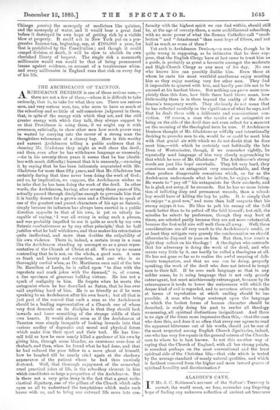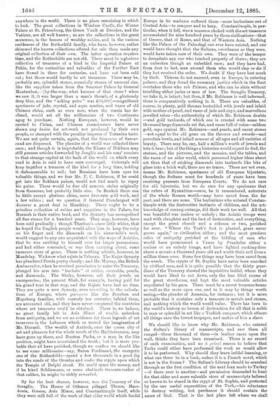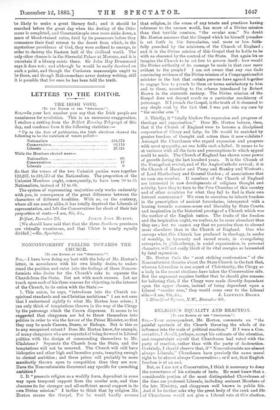ALADDIN'S CAVE.
IF Mr. J. C. Robinson's account of the Sultan's Treasury is correct, the world must, we fear, surrender any lingering hope of finding any unknown collection of ancient art treasures anywhere in the world. There is no place remaining in which to lOok. The great collections in Windsor Castle, the Winter Palace at St. Petersburg, the Green Vault at Dresden, and the Vatican, are all well known ; as are the collections in the great museums, in the houses of wealthy nobles, and in the various residences of the Rothschild family, who have, however, rather skimmed the known collections offered for sale than made any original collection of their own. The latter operation requires time, and the Rothschilds are not old. There must be a glorious collection of treasures of a kind in the Imperial Palace at Pekin, for the curiosities and valuables of the Further East have flowed in there for centuries, and have not been sold out ; but those would hardly be art treasures. There may be, probably are, splendid stones, especially stones of unusual size, like the sapphire taken from the Summer Palace by General Montauban,—[by-the-way, what became of that stone ? when we saw it, it was larger than a man's thumb, of a gloriously deep blue, and the " asking price " was 230,000]—magnificent specimens of jade, crystal, and aqua marina, and vases of old Chinese china, such as even now, when the mania has de- clined, would set all the millionaires of two Continents agog to purchase. Nothing European, however, would be carried to China, and Chinese connoisseurs have never shown any desire for art-work not produced by their own people, or stamped with the peculiar impress of Turanian taste. We are not quite certain, again, that the treasures of Samar- cand are. dispersed. The plunder of a world was collected there once ; and though it is improbable, the Khans of Bokhara may still possess articles forwarded by Jenghiz and his sons' couriers to that strange capital at the back of the world on which every road in Asia.is said to have once converged. Orientals will keep together a treasure of the kind for a long time, holding it dishonourable to sell ; but Russians have keen eyes for valuable things, and we fear Mr. F. C. Robinson, if he could get into the Bokhara palace, would not find much to repay his pains. There would be fine old armour, stolen originally from Saracens, but probably little else. In Bankok there can be little except glorious china, some first-rate gold work, and a few rabies ; and we question if General Prendergast will discover a great deal in Mandelay. There ought to be a priceless collection of rubies and sapphires in the Palace, for Barmah is their native land, and the dynasty has monopolised all fine stones for a hundred years. They may, however, have been sold gradually ; though Theebau's queer little whine, that he hoped the English people would allow him to keep the ruby on his finger and the diamonds on his sister-wife's neck, would suggest to any one acquainted with the ways of Asiatics, that he was exalting to himself over far larger possessions, and had either concealed, or was then carrying about, some immense store of gems. There is nothing artistic, however, in Mandelay. We know what exists in Teheran. The Kajar dynasty has plundered Persia pretty closely; and Mr. Murray, the British Ambassador, when he received permission to enter the Treasury, plunged his arm into " buckets" of rubies, emeralds, pearls, and diamonds. The Shahs, however, sell their jewels on emergencies ; the present Shah, for example, having paid for his grand tour in that way, and the Kajars have had no time. They are quite a new dynasty, even according to the calcula- tions of Europe, where parvenus like the Bourbon and Hapsburg families, with scarcely ten centuries behind them, are accounted old, and they have never conquered the countries where art treasures could be obtained. There is, we believe, -no great family left in Asia Minor of wealth unbroken from antiquity, and we see no evidence for those legends of art treasures in the Lebanon which so moved the imagination of 'Mr. Disraeli. The wealth of Antioch, once the, queen city of art and pleasure for the whole south of the Mediterranean, may have gone up there, and Rustem Pasha, or a man in the like position, might have ascertained the truth ; but it is more pro- bable that all have perished, though we confess we should like to see some millionaire—say, Baron Ferdinand, the energetic one of the Rothschilds—spend a few thousands in a good dig into the sands of. the Orontes and under the crypts upon which the Temple of Delphi stood. He could spare the money, and if he hired Schliemann, or some obstinate treasure-seeker of that calibre, he might be richly rewarded.
By far the best chance, however, was the Treasury of the Seraglio. The Hose of Othman pillaged Thrace, Mace- donia, Greece, Asia Minor, and Constantinople itself, while they were still full of the work of that elder world which feudal Europe in its madness suffered them—mere barbarians out of Central Asia—to conquer and to keep. Constantinople, in par- ticular, when it fell, was a museum choked-with the art treasures accumulated for -nine hundred years by three civilisations—that of Greece, that of Rome, and that of Western Asia. Nothing like the Palace of the Palaeologi can ever have existed, and one would have thought that the Sultans, swordsmen as they were, would have taken care of their own. They were of the temper to decapitate any one who touched property of theirs; they are an unbroken though an enfeebled race ; and they have had, from first to last, men around them who would slay or die if they but received the order. We doubt if they have lost much by theft. Thieves do not succeed, even in Europe, in entering palaces, and they dread the summary justice which in the East overtakes those who rob Princes, and who can be slain without troubling either juries or men of law. The Seraglio Treasury, we take it, is intact; but then, if Mr. Robinson is well informed, there is comparatively nothing in it. There are valuables, of course, in plenty, gold thrones bestudded with jewels and inlaid with mother-of-pearl, and vases of jade and onyx, and marvellous jewelled robes—the authenticity of which Mr. Robinson doubts —and gold tankards, of which one is crusted with some two thousand large diamonds set flat, and vases fall of coins--seldom gold, says cynical Mr. Robinson—and pearls, and uncut stones —not equal to the old gems on the thrones and swords—and porcelain bowls, and inlaid armour of all ages and all varieties of beauty. There may be, say, half a million's worth of jewels and bric-a-brac ; but of the things a historian would expect to find, the statues, and the pictures, and the mosaics, and the tables, and the vases of an older world, which possessed higher ideas about art than that of sticking diamonds into tankards like bits of glass into a brick-wall, there are no traces. There are not even, moans Mr. Robinson, specimens of old European bijoaterie, though the Sultans must for hundreds of years have been receiving presents from European Courts. We do not care for old bijouterie, bnt we do care for any specimens that the rulers of Byzantium—once, be it remembered, autocrats of the whole Roman world—may have saved from the far past, and there are none. The barbarians who entered Constan- tinople with the destructive instincts of children, and the art- knowledge of ourang-outangs, did their work too well. All that was beautiful was useless or unholy ; the Asiatic troops were mad with slaughter and the lust of destruction, and everything, except the great church and a column or two, perished for ever. " Where the Turk's foot is planted, grass never grows again," or civilisation either ; and the most precious relics of antiquity perished at the bidding of men who would have pronounced a Venus by Praxiteles either a useless or an unholy image, and have lighted cooking-fires above a mosaic a thousand years old and worth their evil lives a million times over. Some few things may have been saved from the wreck. The crypts of St. Sophia have never been searched by civilised men, and it is quite possible that the thirty guar- dians of the Treasury showed the inquisitive infidel, whom they would have liked to cut down, only the less filled rooms of the great storehouse, and kept the most valuable articles unpolluted by his gaze. There must be a secret treasure-house as well as the more open one, and in it may be things worth seeing,—the plunder of Armenia, for instance ; but it is more probable that it contains only a treasure in metals and stones, and nothing which the world would value. There has been in the world's history no besom of destruction for all that is noble in man or splendid in art like a Turkish conquest, which effaces all things save the lowest taxpayer, and makes of him a slave.
We should like to know why Mr. Robinson, who entered the Sultan's library of manuscripts, and saw them all ranged—three thousand of them—in leather cases upon the wall, thinks they have been examined. There is no record of such examination, and no a priori reason to believe -that Turks could either have performed the work or would allow it to be performed. Why should they learn infidel learning, or what can there be in a book, unless it is a French novel, which is not in the Koran ? The Sultan's Library should-be searched through as the first condition of the next loan made to- Turkey —if there ever is another—and permission demanded to hunt for that older and more valuable store of mawascripts believed or known to be stored in the crypt of St. Sophia, and proteetied by the one useful- superstition of the Turk,—his reluctance to destroy writing, lest perchance it should contain the name of God. That is the last place left where we shall
be likely to make a great literary find ; and it should be searched before the great day when the destiny of the Otto- mans is completed, and Constantinople once more sinks down, a mass of blood-stained ruins, fired by its possessors before they commence their final retreat to the desert from which, in the mysterious providence of God, they were suffered to emerge, in order to destroy the Eastern half of the civilised world. The only other chance is in the Shereefal Palace at Morocco, and it is uncertain if a library exists there. Sir John Hay Drummond says it does not; and although he would be easily deceived on such, a point, and though the Cordovan manuscripts ought to be there, and though Ma.hommeda.ns never destroy writing, still it is possible that for once he has been told the truth.




















































 Previous page
Previous page